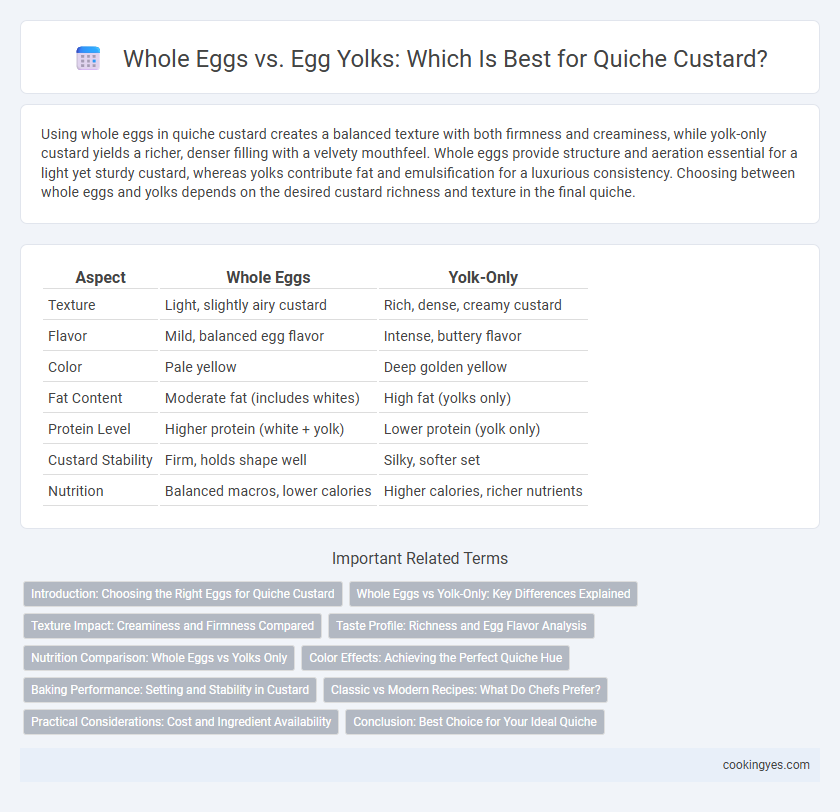Using whole eggs in quiche custard creates a balanced texture with both firmness and creaminess, while yolk-only custard yields a richer, denser filling with a velvety mouthfeel. Whole eggs provide structure and aeration essential for a light yet sturdy custard, whereas yolks contribute fat and emulsification for a luxurious consistency. Choosing between whole eggs and yolks depends on the desired custard richness and texture in the final quiche.
Table of Comparison
| Aspect | Whole Eggs | Yolk-Only |
|---|---|---|
| Texture | Light, slightly airy custard | Rich, dense, creamy custard |
| Flavor | Mild, balanced egg flavor | Intense, buttery flavor |
| Color | Pale yellow | Deep golden yellow |
| Fat Content | Moderate fat (includes whites) | High fat (yolks only) |
| Protein Level | Higher protein (white + yolk) | Lower protein (yolk only) |
| Custard Stability | Firm, holds shape well | Silky, softer set |
| Nutrition | Balanced macros, lower calories | Higher calories, richer nutrients |
Introduction: Choosing the Right Eggs for Quiche Custard
Whole eggs create a balanced quiche custard with a tender yet set texture, blending both protein and fat for optimal structure and creaminess. Using yolk-only increases richness and silkiness due to higher fat content, but can lead to a denser custard that may require careful baking. Selecting between whole eggs and yolks depends on the desired custard consistency and flavor intensity in the quiche.
Whole Eggs vs Yolk-Only: Key Differences Explained
Whole eggs provide a balanced combination of protein and fat, resulting in a quiche custard that is firmer and more set, while yolk-only custard yields a richer, creamier texture due to higher fat content and less coagulation. Quiche recipes using whole eggs achieve better structure and sliceability, whereas yolk-only custards tend to be silkier but may be softer and more delicate when baked. The choice between whole eggs and yolk-only directly influences the quiche's mouthfeel, consistency, and overall custard stability during cooking.
Texture Impact: Creaminess and Firmness Compared
Using whole eggs in quiche custard results in a balanced texture that is both creamy and firm, providing structural stability and a smooth mouthfeel. Yolks-only create a richer, denser custard with heightened creaminess but reduced firmness, which may lead to a more delicate and custard-like consistency. The protein content in whole eggs coagulates more thoroughly upon baking, contributing to a custard that holds its shape better compared to the softer texture yielded by yolk-only mixtures.
Taste Profile: Richness and Egg Flavor Analysis
Whole eggs in quiche custard provide a balanced richness and a pronounced egg flavor, yielding a creamy and cohesive texture. Using yolk-only intensifies the custard's richness and imparts a buttery, velvety mouthfeel but can result in a denser, less airy custard. The choice between whole eggs and yolks significantly influences the custard's taste profile, with yolks emphasizing depth and whole eggs offering a lighter, more delicate egg flavor.
Nutrition Comparison: Whole Eggs vs Yolks Only
Using whole eggs in quiche custard provides a balanced source of protein, vitamins A, D, and B12, along with essential minerals like selenium and choline. Yolks-only custard offers higher concentrations of fat, cholesterol, and fat-soluble vitamins, making it richer but more calorie-dense per serving. Opting for whole eggs results in a lower fat content and a more nutrient-diverse custard, supporting heart health and overall nutrition.
Color Effects: Achieving the Perfect Quiche Hue
Using whole eggs in quiche custard yields a vibrant golden-yellow color thanks to the balance of egg whites and yolks, enhancing the visual appeal of the dish. Yolk-only custard, however, produces a deeper, richer yellow hue that can intensify the quiche's color, making it stand out more on the plate. The choice between whole eggs and yolks affects not only texture but also the final quiche color, influencing presentation and perceived flavor richness.
Baking Performance: Setting and Stability in Custard
Whole eggs enhance quiche custard stability by balancing protein and fat, resulting in a firmer set and better structure during baking. Yolk-only custards yield a richer texture but can be softer and less stable, increasing the risk of a runny center and difficulty in maintaining shape. Using whole eggs ensures optimal coagulation and moisture retention, creating a consistent custard firmness essential for perfect quiche performance.
Classic vs Modern Recipes: What Do Chefs Prefer?
Classic quiche recipes typically use whole eggs to create a balanced custard that sets firmly while maintaining a rich texture, favored by traditional chefs for its stability and ease of preparation. Modern chefs experimenting with yolk-only custards achieve a denser, creamier texture with intensified richness, though it requires precise baking to avoid overcooking. Texture preference and recipe intention dictate choice: whole eggs offer structure and simplicity, while yolk-only custards provide luxurious mouthfeel favored in contemporary culinary approaches.
Practical Considerations: Cost and Ingredient Availability
Using whole eggs in quiche custard is more cost-effective and accessible since whole eggs are typically less expensive and more readily available than yolk-only products. Whole eggs provide a balanced texture and structure, reducing the need for additional ingredients to achieve desired consistency. Choosing whole eggs also simplifies preparation, making it practical for both home cooks and professionals managing ingredient inventory.
Conclusion: Best Choice for Your Ideal Quiche
Using whole eggs in quiche custard provides a balanced texture with both richness from the yolks and structure from the whites, resulting in a creamy yet firm consistency. Opting for yolk-only custard yields a denser, silkier filling with enhanced richness but can lead to a heavier quiche that may lack stability. For the ideal quiche, whole eggs offer the best blend of creaminess, structure, and flavor, making them the preferred choice for most recipes.
Whole eggs vs Yolk-only for quiche custard Infographic

 cookingyes.com
cookingyes.com